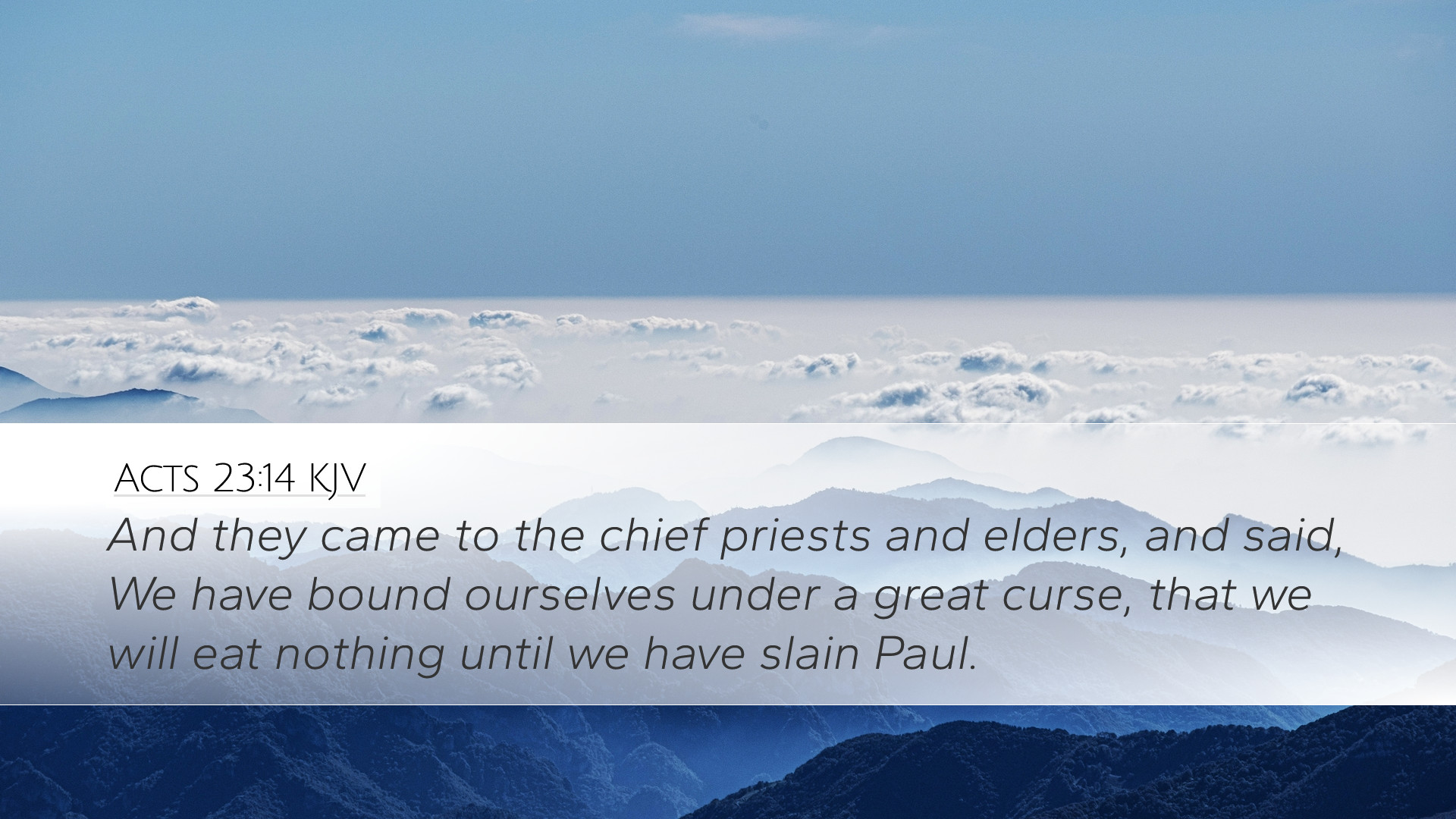Commentary on Acts 23:14
Verse: "And they came to the chief priests and elders, and said, We have bound ourselves under a great curse, that we will eat nothing until we have slain Paul."
Introduction
The book of Acts serves as a crucial bridge between the Gospels and the Apostolic Epistles, chronicling the early days of the Church and the spread of the Gospel. Acts 23:14 presents a real moment of conspiracy against the Apostle Paul, signifying the ongoing opposition he faced. This commentary draws from insights provided by public domain scholars, such as Matthew Henry, Albert Barnes, and Adam Clarke, to offer a rich understanding of this pivotal verse.
Contextual Analysis
In Acts chapter 23, Paul is brought before the Sanhedrin, where he asserts his innocence concerning the charges against him. The tension between Paul and the Jewish leaders is palpable, setting the stage for a conspiracy that unfolds in verse 14. Understanding the sociopolitical dynamics of the time is essential for grasping the depth of this verse.
Sociopolitical Environment
During Paul's ministry, Jewish leaders were deeply threatened by the spread of Christianity. This environment fostered animosity and led certain groups to take desperate measures, including vows to assassinate Paul. This reflected a severe and intense commitment to their beliefs and revealed their moral depravity.
Commentary Insights
Matthew Henry's Perspective
Henry outlines the gravity of the conspiracy, emphasizing that the decision to take a vow to not eat until they had killed Paul indicates the seriousness of their intentions. He notes how these men were willing to go to great lengths, resorting to extreme measures driven by hatred and fear. Furthermore, Henry highlights the futility of opposing God's purpose—Paul was destined to carry the Gospel to the Gentiles regardless of their schemes.
Albert Barnes' Observations
Barnes points out that this premeditated conspiracy illustrates the hostility that arises from losing influence and authority. The Jewish leaders felt threatened by the growing acceptance of Paul’s message and sought to eliminate the threat by any means necessary. Barnes emphasizes that such actions were characteristic of enthusiasts, demonstrating that extremism can lead individuals to bind themselves to oaths that go against the very essence of their faith.
Adam Clarke's Commentary
Clarke takes a slightly different approach, focusing on the role of the elders and chief priests in furthering the conspiracy. He reflects on the psychological aspects behind such a united front. Clarke suggests that the leaders' actions stemmed from a mixture of fear, jealousy, and a perceived need to protect their traditions. He also discusses the implications of their vow, which was a serious commitment in Jewish culture, indicating their determination to see Paul dead.
Theological Implications
This verse invites significant theological reflection on themes of persecution, divine sovereignty, and church leadership. The willingness of the Jews to conspire against Paul raises profound questions about faith, loyalty, and the lengths to which people will go when protecting their beliefs.
Persecution of the Righteous
The fact that Paul, a zealous servant of Christ, became a target highlights the recurring theme of the righteous facing persecution for their faith. This resonates throughout scripture and serves as a reminder that opposition often comes from those threatened by the truth, exemplifying the spiritual warfare that exists.
Divine Sovereignty
Amidst the conspirators' plans, the narrative reinforces the principle of divine sovereignty. Despite the elaborate schemes set against Paul, God’s purpose prevails. It encourages believers to trust in God’s overarching plan, especially in situations that seem dire or hopeless, as God works through and around human schemes.
Leadership and Accountability
This passage also speaks to the responsibilities of church leaders and the importance of integrity in their actions. The ethical implications of the conspiracy challenge modern leaders to evaluate their motives and commitments to Christ and the Gospel, reminding them of the potential pitfalls of power and influence.
Practical Applications
Reflecting on Acts 23:14 offers various practical applications for contemporary believers and leaders alike.
- Vigilance Against Conspiracy: It calls for awareness among Christians about the plots against the faithful, both in the spiritual and physical realms.
- Commitment to Truth: Believers are reminded to uphold the truth of the Gospel, even in the face of opposition or threats.
- Prayer for the Persecuted: This verse brings to light the necessity of praying for those who suffer for their faith, reflecting a communal spirit among the body of Christ.
- Integrity in Leadership: Encourages leaders to reflect on their motives and actions, fostering accountability and transparency in their ministries.
Conclusion
Acts 23:14 serves as a sobering reminder of the realities of opposition within the Christian journey, the grave commitments people make in the name of zeal, and the incomparable power of God’s sovereignty. By examining the insights from Henry, Barnes, and Clarke, we are urged to reflect on our faith, our leadership roles, and our stand for the truth amidst a world that may conspire against us.


